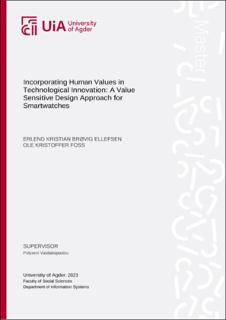| dc.description.abstract | This study uses Value-Sensitive Design (VSD) to explore user values related to smart-watches. As the popularity of smartwatches increases, and to build responsible and ethi-cal solutions, it is critical to reflect on what values are most important to people and how those values can be reflected in the design of the technology. Overall, the study includes three interrelated parts: a conceptual, an empirical, and a technical investigation. The three-part approach followed is the typical VSD approach. The conceptual investigation consists of identifying key values for users, the empirical investigation consists of inter-views and analysis based on the identified values, and the technical investigation con-sists of creating prototypes and testing those prototypes in collaboration with users.
The findings of this study provide insight for research and practice. First, we identi-fied in the literature values that are commonly listed as important (security, privacy, transparency, sustainability, performance and reliability, control, trust, and human wel-fare) and investigated their significance for smartwatch users identifying the ones that are perceived as most important for them. Secondly, we integrated the values identified within prototypes and assessed these designs with users. We refined the prototype de-signs using user feedback ending up with a proof of concept that can be adopted by the industry. Overall, the study shows a lack of knowledge about risks amongst users and how adding layers of transparency within technology can help users make more in-formed choices about their privacy and security.
Overall, the thesis takes a human-centered approach to explore the ethical issues and user experience concerns that emerge with smartwatch technologies. By focusing on the needs, perspectives, and priorities of smartwatch users themselves, this research provides design recommendations that are sensitive to values and consider user preferences. The findings from this study contribute to a growing area of research on smartwatches and wearable technologies. They offer researchers and industry practitioners key insights into the complex challenges posed by these increasingly ubiquitous devices. The recom-mendations provided can help guide future work that takes a human-centered view to-ward building smartwatch devices and related smartwatch management applications designed for both usefulness and human well-being. | |
